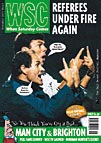The Archive
Articles from When Saturday Comes. All 27 years of WSC are in the process of being added. This may take a while.
 Adam Brown of the Football Supporters Association was in Turin for a Champions League game between Juventus and Man Utd. He recalls seeing some highly old-fashioned police tactics first hand
Adam Brown of the Football Supporters Association was in Turin for a Champions League game between Juventus and Man Utd. He recalls seeing some highly old-fashioned police tactics first hand
This is getting to be a bit of a habit. Manchester United head off to Europe, full of optimism that this year we’ll get it right, only for things to go horribly wrong both on the pitch and off it. Perhaps we shouldn’t be surprised then, when our trip to Juventus ended in tears, not due to the 1-0 defeat but because we’d been tear-gassed, as well as beaten with batons and crushed.
 Matt Nation explains why his name can be added to the list of people who have had life-changing experiences involving Norman Hunter and a cinder pitch
Matt Nation explains why his name can be added to the list of people who have had life-changing experiences involving Norman Hunter and a cinder pitch
Norman Hunter was one of the few players who would have induced me to wade bleeding and naked through an open sewer for a chance to see him, such was the esteem in which I held him. Although in the twilight of his career when he arrived at Bristol City, he was still famous, still a cut above the rest and still capable of turning the flow of a game by scything down the opponents’ playmaker in full flight. If there was one man who definitively captured and held my interest in football, that man was Norman Hunter.
 Mike Ticher looks at Australians playing professionally in the UK
Mike Ticher looks at Australians playing professionally in the UK
It took a long time for Australian players to be taken seriously in England, despite the success of some early pioneers. Joe Marston left Sydney to play 185 games for Preston in the early 1950s, and won a loser’s medal in the 1954 Cup Final. It was another twenty years before Craig Johnston followed in his footsteps. Tony Dorigo completed the meagre roll-call of Australians who made it in what might be called the freelance period. Dorigo had to write personally to every club in the First Division for a trial before finally coming over to join Aston Villa in 1983.
 Phil Ball examines why the city of Pamplona in Northern Spain has long been a haven for expatriate British footballers
Phil Ball examines why the city of Pamplona in Northern Spain has long been a haven for expatriate British footballers
Since the construction of the new motorway, San Sebastian to Pamplona only takes 50 minutes by car now, over the rainy mountains and down into the meseta that opens out into southern Navarre. To the east of the city, on the old road up to the French Pyrenees, Club Atlético Osasuna are training in a downpour. You can tell they’re in the Second Division now – First Division sides regularly attract hundreds, sometimes thousands to training sessions. Here there are at most a dozen assorted kids and pensioners moping on the cold stone steps of the training ground.